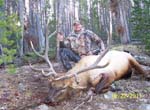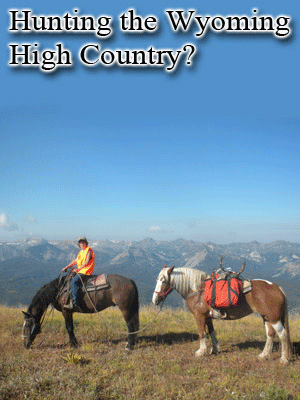Here you go NFH
As a game warden for the Crow Tribe in southern Montana, Clayvin Herrera has cited poachers ? mostly nontribal members ? as one of his duties.
But now he has found himself on the opposite side of the law.
Last year, Herrera and two other Crow tribal members were charged by a Wyoming Game and Fish Department warden for killing three bull elk without licenses.
Now Herrera finds himself embroiled in a 147-year-old treaty rights quarrel.
"We just needed food that day," Herrera said. "It's evolved since then into this craziness, and it's started to get political, and I don't like politics at all."
Herrera has been a game warden for the Crow Tribe since 2012, working for a couple of years before that as a cop for the Bureau of Indian Affairs. So the reservation is a place he's familiar with.
He grew up just north of Fort Smith ? a town of 160 folks that sprang up when Yellowtail Dam was built in the early 1960s on the northern end of the Bighorn Canyon National Recreation Area.
"This is where I learned how to hunt, walking down Soap Creek hunting whitetails and shooting birds," said Herrera, 33, gesturing out the window to the golden grasses of a nearby field, the Bighorn Mountains rising in the background.
Back when Herrera was a youngster, when a family member shot an elk or deer, his grandmother would telephone her sisters, who would arrive to help butcher the meat while the group chatted in Crow, the only language Herrera knew until he started grade school.
"When you bring an elk home and you don't tell anybody, pretty soon the calls and texts start coming in," Herrera said.
That's just the way the tribe operates, he said. When tribal members are hungry ? which can be often at the reservation ? other Crows pitch in to help feed them. On a reservation with a 30 percent poverty rate and a 46 percent unemployment rate, such acts of sharing are not uncommon.
The hunt that has landed three men -- Herrera, his brother Colton, and Ronnie Fisher -- in court occurred on Jan. 28, 2014. They had driven into a southwestern corner of the reservation, at the base of the Bighorn Mountains, in search of elk when they spotted a herd on a ridge above Eskimo Creek.
With up to 3 feet of snow on the ground in some places, they trudged closer, following the moving herd for about two miles before finally seeing three bulls within shooting range. In the process of hiking, though, the men had left the Crow Reservation and moved into the state of Wyoming's Bighorn National Forest.
"Grandma always told stories about the mountains and how we can hunt," Herrera said. "'Never let anyone tell you what you can't do,'" he said she told him, always speaking in Crow.
So the men knew, when they each pulled the trigger, that they were no longer on the reservation.
***
Herrera said it took eight hours for the men to pack out the elk meat and heads. He bristled at the accusation that they left any of the meat behind.
"We took all the meat," he said. "It was Ronnie's and my brother's first elk, otherwise we would've left the heads."
The meat from his elk fed Herrera and his three daughters ? he's a single father ? for a month, lots of spaghetti with meat sauce and Hamburger Helper.
A Wyoming Game and Fish Department official refused to comment on the case since it is ongoing.
Trouble came about eight months later when the three men were cited for poaching by a Wyoming Game and Fish warden.
The Sheridan Press reported in a Feb. 6 story that when the tribal members attended a pretrial conference in Sheridan County Circuit Court, Colton Herrera asked for a change of plea hearing and Fisher and Clayvin Herrera told the judge they intended to represent themselves and would use a tribal rights defense.
With the new information the judge decided to schedule a new change of plea hearing for Colton Herrera on March 9. Clayvin Herrera and Fisher have status conferences set for March 12.
At the root of Herrera's assertion of Crow treaty rights to hunt in Wyoming's Bighorn Mountains are the 1851 and 1868 Fort Laramie treaties.
In 2013, the Crow tribal government adopted a resolution that called for the tribe to "exercise fully its treaty right to hunt on all unoccupied lands of the United States which are located within the traditional Crow homeland."
The tribe defined the region as stretching from the Bears Paw Mountains in northern Montana, west to the Absaroka and Beartooth mountains, south to the Wind River Range in Wyoming and east to the Black Hills of western South Dakota and northeastern Wyoming.
In 2013, the tribe also said it would develop regulations for off-reservation hunting and a licensing process, which has not occurred, according to Conrad Stewart, chairman of the tribe's Natural Resources Committee, although he said the tribe has had conversations with Montana officials.
Still, Stewart had a public notice drawn up, dated Feb. 12, in support of the Herreras and Fisher to exercise their treaty hunting rights in Wyoming.
"It is the position of this Committee this activity is protected by the Crow Tribe's agreement with the United States Government; and, that such activity will be rigorously enforced under this supreme law," the notice states, in part.
"It's kind of an issue of what's the bigger crime," Stewart said.
"We're talking about a treaty," he added. "We're not going to let a state dictate to a sovereign nation."
***
History doesn't seem to be in the Crow Tribe's favor. A 1995 ruling by the 10th U.S. Circuit Court of Appeals sided with Wyoming in a similar case. Tyrone Ten Bear was cited by Wyoming Game and Fish for killing an elk in the Bighorn National Forest without a license.
Although Ten Bear's attorneys asserted a treaty right to hunt on the land, the court said that right was lost when Wyoming became a state in 1890.
The Crow Tribe appears to be hanging its new hopes on a later court decision. A 1999 ruling by the U.S. Supreme Court acknowledged that hunting and fishing treaty rights for the Mille Lacs Band of Chippewa in Minnesota were still valid off the reservation. That treaty dated back to 1837.
Herrera's been able to put the issue behind him to some extent, finding peace while sitting under the cottonwood tree outside his childhood home.
He hopes the charges may lead to better communication between the Crow Tribe and the state of Wyoming. It may also promote more talk between tribal members about poaching and waste. Herrera would like to see the tribe integrate a hunter safety course into the schools.
Maybe the situation will even be a place to start talking about enforcing hunting regulations on tribal members. Right now, there is no hunting season on the reservation. Consequently, big game like deer and elk are often hard to find.
"You can get sucked into that negativity easy," Herrera said. "So I'm moving forward as a Crow Indian in a modern society. We still have our own ways and our culture. So we're lucky we still have a lot of the things we had before ? including our hunting rights.
"From our perspective, it's a right we've always had."
 Urge 2 Hunt
Urge 2 Hunt

